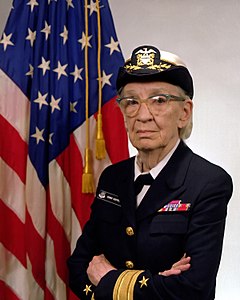Grace Hopper: A Pioneer in Computer Science

As March unfolds and Women’s History Month takes center stage, it’s essential to honor the remarkable women who have made significant contributions to the fields of science, technology, engineering, and mathematics (STEM). Among these trailblazers stands Grace Hopper—a visionary computer scientist whose groundbreaking work revolutionized the world of computing and inspired generations of innovators. Let us delve into the extraordinary life of this pioneering figure and the profound impact of her legacy.
Grace Brewster Murray Hopper was born on December 9, 1906, in New York City. From a young age, she exhibited an insatiable curiosity and a passion for mathematics and science. After earning degrees in mathematics and physics from Vassar College and Yale University, Hopper embarked on a distinguished career in academia and the military.
During World War II, Grace Hopper joined the United States Navy Reserve and was assigned to work on the Mark I computer at Harvard University. It was here that she made her first major contribution to the field of computing, developing the first compiler for a computer programming language. This groundbreaking innovation laid the foundation for modern computer programming and earned Hopper the nickname “Amazing Grace.”
Despite her monumental achievements, Grace Hopper faced considerable challenges and obstacles in her career. As a woman in a male-dominated field, she encountered sexism and discrimination from colleagues and superiors who doubted her abilities and questioned her legitimacy. Yet, Hopper remained undeterred, her intellect, and determination propelling her forward in the face of adversity.
One of Grace Hopper’s most significant contributions to computer science came in the development of the COBOL programming language. COBOL, which stands for “Common Business-Oriented Language,” was designed to be easily understood by non-technical users and became the dominant programming language for business applications. Hopper’s advocacy for COBOL helped to standardize programming practices and expand access to computing technology.
While Grace Hopper’s work did not directly lead to changes in laws, her pioneering contributions to computer science helped to shape the modern technological landscape and laid the groundwork for future innovations. Her legacy continues to inspire generations of scientists, engineers, and innovators to push the boundaries of what is possible and harness the power of technology for the greater good.
As we celebrate Women’s History Month, let us honor the enduring legacy of Grace Hopper—a woman whose brilliance, creativity, and unwavering commitment to innovation continue to inspire us all. May her life serve as a reminder of the importance of diversity, inclusion, and perseverance in the pursuit of knowledge and progress.
Sign up for Kristy's Newsletter!
Get all the updates on upcoming books and events!
